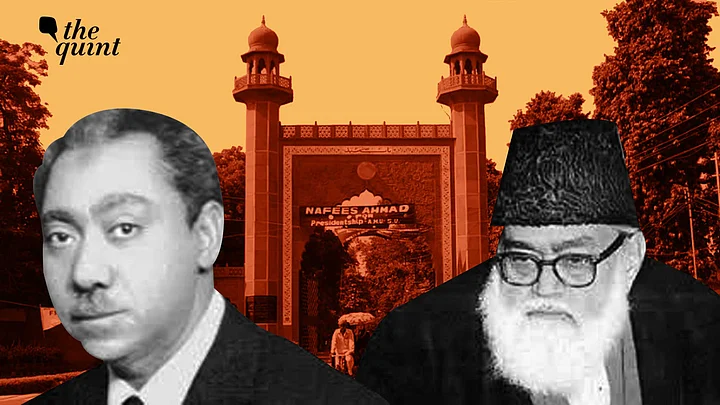The Aligarh Muslim University (AMU) is dropping the work of two Islamic scholars – Sayyid Qutb and Abul A’la al-Maududi – “in order to avoid any controversy.”
On 27 July, 25 academicians wrote an open letter addressed to Prime Minister Narendra Modi, which said that AMU has an “anti-Indic/anti-national course curriculum,” as a part of its Islamic Studies course. Four days later, AMU dropped the works of Qutb and Maududi.
Omar Peerzada, the AMU PRO, told The Quint, “As conveyed by the Chairman of the Department of Islamic Studies, parts of the syllabus have been removed in order to avoid any controversy.” Peerzada said that these portions were “a part of an optional subject in BA and MA course of Islamic Studies and have been dropped as there were some complaints, based on which the decision was taken.”
Peerzada added;
There was nothing objectionable that was being taught under these courses. These portions have been a part of the curriculum for the last 50 years.AMU PRO Omar Peerzada
Professor Muhammed Ismail, Professor, and Chairman, of the Department of Islamic Studies at AMU was informed on 31 July morning by the Vice Chancellor of the University that the two scholars be removed from the syllabus. "I don't have much clarity on why this was done. I was just told that there have been some complaints," he said.
The letter by 25 academicians, including Madhu Kishwar, a pro-Hindutva activist and a Senior Fellow at the Nehru Memorial Museum and Library (NMML), said, “Since these universities are being supported by public money, we as taxpayers and concerned citizens have a right to demand action against such teachings.”
‘We Might Not Agree With Them, But Still Important For Students’
Professor Ali Nadeem Rezavi of the Department of History, AMU, told The Quint that one need not necessarily agree with the scholars in order to acknowledge that they are important to study.
I might not agree with their ideologies, but it is still important for students to study ideologues like them. Sometimes we need to learn about certain topics so that the same mistakes are not repeated.History Professor, Ali Nadeem Rezavi
Another professor, who taught the two scholars as a part of his course, and did not want to be named, told The Quint, “It came to our notice that there had been a few complaints. But if there is something problematic in the syllabus content, then why is it being removed after so many years of teaching it? We do not know what the issues were but we do know that it was done just to avoid controversy.”
But who are these scholars that were being taught by the Islamic Studies department at AMU?
Qutb, a 20th-century Egyptian author, ideologist, and theorist, was a leading member of the Egyptian Muslim Brotherhood, a Sunni organisation. He authored at least 24 books. He was among the most influential Islamic theoreticians in the 1900s.
Meanwhile, Maududi was a 20th-century Islamist scholar, historian, and ideologue who worked actively on the “Two Nation” theory during the Partition of India. According to Professor Rezavi, Maududi was a progenitor of the Jamaat-e-Islami, a socio-religious movement founded in 1941. He was born in India and migrated to Pakistan.
Regarding the importance of the scholars, Professor Ismail said, “Both of them were established thinkers of their times. Maududi wrote around 100 books while Qutb wrote around 30. Both of them wrote about a number of topics within the parameters of Islamic studies. They interpreted the Quran, wrote about how Islamic governments should be established and how they should function for the welfare of society.”
Professor Ismail said that the students of the department were taught Maududi "under different units, such as his political thoughts and religious thoughts.”
The open letter by the 25 academicians said that “it is a matter of deep concern and worry that the writings of Maududi, widely recognised as the authoritative fountainhead of Jihadi Islam in the 20th century, are part of the course curriculum of the above-mentioned three Islamic universities.” The other two universities named were Jamia Millia Islamia and Jamia Hamdard University.
The letter claimed that his ideology “played a significant role in fanning the fires of Muslim separatism during India’s freedom struggle.”
Professor Rezavi told The Quint;
AMU has always been “an independent institute that has decided what to teach and what not to teach by itself. Why should we buckle under pressure because of a few complaints?History Professor Ali Nadeem Rezavi,
‘The Process Is Ongoing’ Says University
Professor Rezavi also explained that there is a procedure in place for revising a curriculum. “No course can be included, excluded, or dropped without holding the Board of Studies (BOS) of the concerned department. This recommendation of the BOS is then to be passed in the Faculty meeting and then the Academic Council.”
The PRO said that the procedure “will be followed and the process is currently underway. The syllabus is being revisited.” It is pertinent to note that the portions, however, have already been removed.
A similar controversy had broken out at the University in 2018 when a BJP MP from Aligarh complained about a portrait of Mohammad Ali Jinnah.
Back then, the university had argued that Jinnah was a life member of the AMU Students’ Union, and that traditionally, all life members' portraits find a place on the AMU walls. However, unlike parts of the syllabus that have been removed, the portrait still stands.
(At The Quint, we question everything. Play an active role in shaping our journalism by becoming a member today.)
